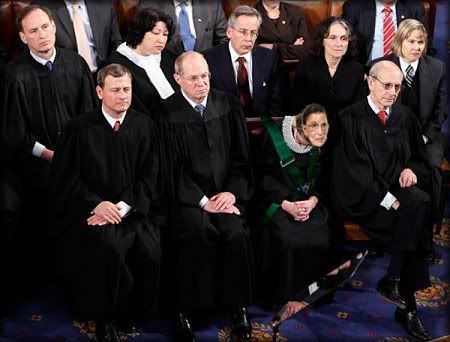Skip to comments.
Justice Ginsburg on “Judicial Activism” in the Roberts Court
The Volokh Conspiracy ^
| August 27, 2013
| Jonathon Adler
Posted on 08/30/2013 8:58:58 PM PDT by NotYourAverageDhimmi
Justice Ruth Bader Ginsburg believes the Roberts Court is “one of the most activist courts in history,” according to a widely cited interview with the NYT‘s Adam Liptak.
”Activist” is a slippery label, often indicating nothing more than disagreement with a Court’s decision in a given case. fortunately Justice Ginsburg provided Liptak with a definition. Specifically, Ginsburg told Liptak that “if it’s measured in terms of readiness to overturn legislation, this is one of the most activist courts in history.” This is one way to define judicial activism, but if this is the definition Justice Ginsburg wants to use, her accusation falls wide of the mark.
If activism is “measured in terms of readiness to overturn legislation,” the current Court is not one of the “most activist courts in history,” at least not compared to others of recent memory. As Liptak’s own reporting has shown, the Roberts Court is the least activist Court of the post-war period by this measure, invalidating federal statutes far less often than did the Warren, Burger, or Rehnquist Courts. Liptak wrote his earlier story in July 2010, but the conclusion still holds. Since 2010 the rate at which the Roberts Court has struck down federal legislation has actually declined. According to the same report, the Roberts Court overturns precedent at a lower rate than did prior post-War courts.
If in calling the Roberts Court ”one of the most activist courts in history,” Justice Ginsburg meant that the Roberts Court is more activist than, say, the seriatim or Marshall Court, she has a point. If she meant to imply the Roberts Court is any more “activist” than any other court in the past 60 years, she doesn’t.
Justice Ginsburg’s apparent concern at her colleagues’ propensity to invalidated federal legislation is curious for another reason: She votes to overturn federal legislation as much as any justice on the Court other than Justice Kennedy. She’s not only joined numerous opinions in which the Roberts Court has struck down federal laws (e.g. Windsor, AID v. AOSI, Alvarez, Stevens) , she’s dissented in cases — such as Holder v. Humanitarian Law Project and Salazar v. Buono — in which legislative action was upheld. I’m fairly confident Justice Ginsburg was one of four justices voting to overturn the citizenship transmission law at issue in Flores-Villar v. United States, in which the Court split 4-4 . As a consequence, had Justice Ginsburg’s view prevailed in every case heard in the past four terms, just as many federal law would have been struck down. So much for her allegation of “activism.”
Looking at the actual behavior of the Roberts Court, it becomes clear that Justice Ginsburg’s real complaint is with the substance of specific opinions, not that the Court is too “activist” (as she herself defines the term). Indeed, in many cases, Justice Ginsburg believes the Court is not “activist” enough, and too willing to uphold federal action. There are those who believe the the Supreme Court should be more deferential to Congress across the board, and thus less “activist,” but Justice Ginsburg is not one of them. She just disagrees with her colleagues about when the Court should scrutinize legislative action, and when it should defer.
TOPICS: Constitution/Conservatism; News/Current Events
KEYWORDS: ginsburg; johnroberts; justiceginsburg
To: All
2
posted on
08/30/2013 9:06:41 PM PDT
by
musicman
(Until I see the REAL Long Form Vault BC, he's just "PRES__ENT" Obama = Without "ID")
To: NotYourAverageDhimmi
‘Justice’ Ginsburg swore to uphold the Constitution yet, when commenting on the possible new ‘Constitution’ of Egypt, declined to support the USA Constitution saying that Egypt should look to other country’s Constitutions. ‘Justice’ Ginsburg would be impeached, if we were allowed to impeach anyone on the USSC.
3
posted on
08/30/2013 9:09:02 PM PDT
by
originalbuckeye
(Never yield to force; never yield to the apparently overwhelming might of the enemy)
To: NotYourAverageDhimmi
Justice Ginsburg is one of the most bloodthirsty abortionists in the sordid history of the Supreme Court. For her to decry judicial activism and equate that with a propensity to find unconstitutionality in federal legislation is typical of her distortion of language, her duty, and our system of government.
Since Marbury vs. Madison the test has been whether a case before the court presents an issue of unconstitutionality. Judicial activism is not finding unconstitutional legislation unconstitutional, judicial activism is creating constitutional dogma out of thin air as the court did in Roe vs. Wade which justice Ginsburg has sought to expand at every turn. It is the duty of the court to avoid judicial activism but to enforce the Constitution. It is equally activist to fail to strike down unconstitutional legislation, such as occurred in Obamacare, as it is to strike down constitutional legislation, whether that legislation emanate from the federal or state governments, such as occurred in Roe V Wade.
Federal legislation has no primacy over state legislation if it is not pursuant to an enumerated power of the federal government. To uphold legislation which is not so authorized is activist in the extreme and it is, sadly, the increasing tendency of justices like Ginsburg to distort our Constitution and our government by this kind of judicial arrogance.

4
posted on
08/30/2013 9:14:12 PM PDT
by
nathanbedford
("Attack, repeat, attack!" Bull Halsey)
To: NotYourAverageDhimmi; ding_dong_daddy_from_dumas; stephenjohnbanker; Gilbo_3; NFHale; Impy; Liz; ...
RE :”
Justice Ruth Bader Ginsburg believes the Roberts Court is “one of the most activist courts in history,” according to a widely cited interview with the NYT‘s Adam Liptak. “ Saw this.
My first response was :”Didn't you rule with the 5-4 majority to overturn a 10,000 year old time tested tradition? Hetrosexual Marriage?? The foundation of the family and raising kids? “
She has a lot of nerve to whine about activism (specifically she means overturning laws.)
AH!
5
posted on
08/30/2013 10:01:55 PM PDT
by
sickoflibs
(To GOP : Any path to US Citizenship IS putting them ahead in line. Stop lying about your position.)
To: NotYourAverageDhimmi
Justice Ruth Bader Ginsburg believes the Roberts Court is “one of the most activist courts in history,” according to a widely cited interview with the NYT‘s Adam Liptak. Shocking honesty from a liberal! What else but activism can explain the invalid, obviously incorrect and no doubt politically- or blackmail-motivated O-Scare "ruling"?
6
posted on
08/30/2013 10:18:37 PM PDT
by
Still Thinking
(Freedom is NOT a loophole!)
To: NotYourAverageDhimmi
Hang in there Ruthie!
The supreme court of an obamanation needs a little comic relief.

To: All
8
posted on
08/30/2013 10:26:34 PM PDT
by
musicman
(Until I see the REAL Long Form Vault BC, he's just "PRES__ENT" Obama = Without "ID")
To: nathanbedford
She is most assuredly evil directly from the source. She will see ted kennedy and saddam one day.
9
posted on
08/31/2013 5:23:33 AM PDT
by
LibLieSlayer
(FROM MY COLD, DEAD HANDS!)
To: Perdogg; BuckeyeTexan; Lurking Libertarian; JDW11235; Clairity; TheOldLady; Spacetrucker; ...
10
posted on
08/31/2013 7:33:19 AM PDT
by
Perdogg
(Cruz-Paul 2016)
To: NotYourAverageDhimmi; Jacquerie
One or more of Mark Levin's Liberty Amendments addresses the out of control Judiciary:
-----------
Restoring the Judiciary to its proper role:
The Judiciary was never meant to be an all-powerful institution in which five men in robes have the final say over every major policy battle in the country. In order to end judicial tyranny, Levin proposes limiting service to one 12-year term, and granting both Congress and the state legislatures the authority to overturn court decisions with the vote of three-fifths of both houses of Congress or state legislative bodies.
The Liberty Amendments by Mark Levin on Amazon.com
11
posted on
08/31/2013 8:35:02 AM PDT
by
boxlunch
(Psalm 94)
To: boxlunch
Yep.
No one likes to get smacked down, and knowing that congress or the states can overturn loony decisions would go a long way toward minimizing said loony decisions in the first place.
Mark's amendments mean a government even more federal than the framers’ design. That is a good thing.
12
posted on
08/31/2013 9:11:04 AM PDT
by
Jacquerie
(To restore the 10th Amendment, repeal the 17th.)
To: Jacquerie
As long as people understand by “federal” you mean power BALANCED between the STATES and federal government (the true meaning of federal).
The term “federal” has been misused and misunderstood for quite a while now and to most it means giving more power to the US “federal” level of government.
13
posted on
08/31/2013 9:15:51 AM PDT
by
boxlunch
(Psalm 94)
To: boxlunch
The term “federal” has been misused . . . Even Mark mistakenly uses that term for today's consolidated government.
Articles of Confederation - Entirely federal.
Framers' Constitution - Compound, partly federal.
Progressives' Constitution since 1913 - Consolidated, zero federalism.
14
posted on
08/31/2013 9:40:26 AM PDT
by
Jacquerie
(To restore the 10th Amendment, repeal the 17th.)
To: sickoflibs
I would like to see a poster of the progression of gay marriage.
First: There would be a outline of a man and a woman with the caption—”Marriage as mankind has known it for 5,000 years.” There would be a diagonal cross out line through it.
Second: “Marriage in the not too distant future. There would be several pictures—two men, two women, a bearded man wearing a dress with another man wearing leather regalia, two women and a man, two men and a woman, three women and a man, three men and a women, etc. etc.
To: boxlunch
We have had over two hundred years of experience to see how the courts have usurped their authority.
Disclaimer:
Opinions posted on Free Republic are those of the individual
posters and do not necessarily represent the opinion of Free Republic or its
management. All materials posted herein are protected by copyright law and the
exemption for fair use of copyrighted works.
FreeRepublic.com is powered by software copyright 2000-2008 John Robinson





 freepmail
freepmail